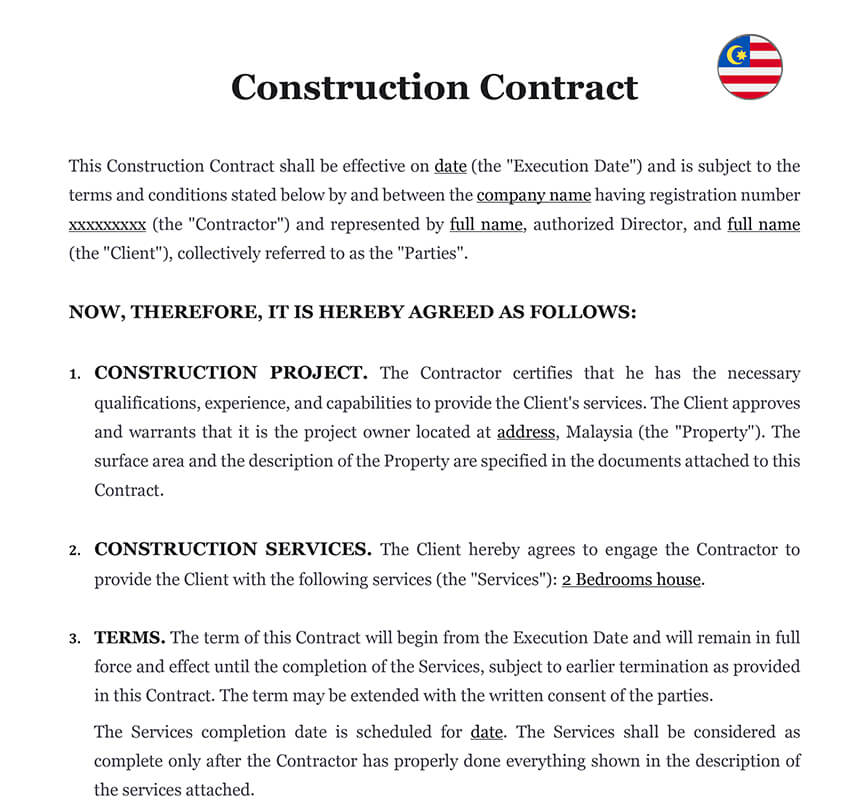Ready to use legal template
Drafted by experienced lawyers
Chinese-English translation
Ready to use legal template
Drafted by lawyers
Chinese-English translation
Home › Buy a property › Construction contract
Learn more about Construction Contract in China
A construction contract is a legally binding agreement between a property owner and a contractor that defines the scope of work, timelines, payment terms, and responsibilities for a construction project. In China, a well-drafted construction contract is essential to ensure compliance with local construction laws, mitigate risks, and protect the interests of all parties involved. Whether for residential, commercial, or infrastructure projects, a clear and enforceable contract helps prevent disputes, delays, and cost overruns. It outlines key provisions such as project specifications, quality standards, subcontracting rules, and dispute resolution mechanisms under Chinese law. Download our easy-to-edit Word format construction contract, available in both English and Mandarin, to safeguard your construction projects with a legally sound and professional agreement.
Table of contents
-
What is a Construction Contract in China?
-
What is included in this Construction Contract?
-
How is a Construction Contract regulated under Chinese law?
-
How do payment terms work in a Construction Contract?
-
How do Construction Contracts handle project delays in China?
-
How can disputes be resolved in a Construction Contract in China?
-
What are the contractor’s obligations in China?
-
Can a Construction Contract be terminated early?
-
What legal protections does a Construction Contract offer?
What is a Construction Contract in China?
A construction contract in China is a formal agreement that lays out the specific terms and conditions for the construction project. The contract serves as a protection tool for both the contractor and the client by setting clear obligations, payment structures, and timelines. It defines the scope of work, addresses dispute resolution mechanisms, and ensures compliance with Chinese laws governing construction, labor, and safety.
Key legal frameworks governing these contracts include the Construction Law of the People’s Republic of China and the Contract Law of the People’s Republic of China. These laws dictate various aspects, such as project management, labor rights, and the quality standards for construction work.For more information on Chinese construction laws, refer to: Construction Law of the People’s Republic of China
What is included in this Construction Contract?
A well-drafted construction contract includes several crucial clauses that define the responsibilities of both the contractor and the client. These clauses ensure the project progresses smoothly and is completed according to the set standards:
| ➤ Construction Project: Defines the contractor’s qualifications and project location in China, requiring legal property documentation. |
| ➤ Construction Services: Specifies the scope of work, ensuring alignment with client expectations. |
| ➤ Terms: Outlines the contract duration, completion timeline, and potential extensions. |
| ➤ Construction Fees: Details payment structure, milestone-based payments, and penalties for delays. |
| ➤ Reimbursement and Expenses: Requires pre-approval for additional expenses, ensuring tax compliance. |
| ➤ Services Changes: Regulates modifications, additional fees, and timeline impacts. |
| ➤ Contractor Autonomy: Affirms independence while maintaining alignment with client requirements. |
| ➤ Equipment and Materials: Ensures compliance with China’s safety and environmental regulations. |
| ➤ Subcontractors: Allows subcontracting under contractor supervision, ensuring labor law compliance. |
| ➤ Client Liability: Defines client responsibilities, including obtaining government approvals. |
| ➤ Contractor Liability: Establishes liability for damages due to negligence, limited to contract fees. |
| ➤ Non-disclosure: Protects confidential project information and intellectual property. |
| ➤ Termination: Defines conditions for contract termination, including breach or insolvency. |
| ➤ Intellectual Property Rights: Affirms contractor ownership of design and construction techniques. |
| ➤ Force Majeure: Covers delays caused by unforeseen events (e.g., natural disasters). |
| ➤ Entire Contract: States that the agreement supersedes prior discussions. |
| ➤ Governing Law and Jurisdiction: Specifies Chinese law and court jurisdiction. |
| ➤ Documents Attached: Lists required supporting documents from both parties. |
🔗 Download our Interior Design Contract to ensure a clear agreement on design services, ideal when the project involves interior work only, not full construction.
How is a Construction Contract regulated under Chinese law?
1. Legal Framework for Construction Contracts
Construction contracts in China are primarily governed by the Construction Law of the People’s Republic of China and the Contract Law of the People’s Republic of China. These laws set forth rules that govern construction practices, the rights of contractors and clients, and provide a legal basis for resolving disputes. A construction contract must comply with both national and local regulations, including municipal building codes, environmental regulations, and labor laws. These laws serve to ensure that construction projects are carried out in a safe, fair, and legally compliant manner.
2. Local Regulations and Compliance
In addition to national laws, there are also local building codes and construction safety regulations that apply. Contractors must follow these guidelines, which are specific to the region where the project is located. Failure to adhere to these regulations could result in penalties, delays, or even project cancellation. For more information on regional regulations and compliance, see: Ministry of Housing and Urban-Rural Development
🔗 Download our Architect Contract to outline design responsibilities and project scope, ideal when hiring an architect for planning and design, separate from construction work.
How do payment terms work in a Construction Contract?
1. Payment Structure
In a typical construction contract, payment is usually made in stages or milestones based on completed work. Each payment is contingent upon the completion of specific phases of the project, such as finishing the foundation or structural work. The total contract price and payment schedule are clearly defined in the agreement to avoid misunderstandings. Additionally, payments are often subject to final inspections or approvals from the client to ensure the work meets the agreed standards.
2. Penalties for Late Payments
The contract often includes penalties for late payments, which can be a percentage of the overdue amount. These penalties ensure timely payments, which are crucial for contractors to maintain cash flow during the project. The penalties serve as an incentive for the client to meet their financial obligations and prevent delays that could impact the project timeline.
How do Construction Contracts handle project delays in China?
1. Handling Delays
Delays can occur for various reasons, such as weather conditions, unforeseen site issues, or delays in receiving necessary permits. The construction contract must include provisions to address these delays. In cases where the delay is due to factors beyond the contractor’s control, such as force majeure events (e.g., natural disasters or governmental restrictions), the contractor is typically granted an extension of the project timeline.
2. Consequences of Delay
If delays occur due to the contractor’s fault, the contract should specify penalties or liquidated damages that the contractor must pay. Similarly, if delays are caused by the client, the contractor may be entitled to additional compensation or time extensions.
How can disputes be resolved in a Construction Contract in China?
1. Dispute Resolution Methods
Disputes arising from construction contracts in China are commonly resolved through mediation, arbitration, or litigation. Mediation is often the first step and may involve a third-party mediator to help the parties reach an amicable solution. If mediation fails, arbitration is typically pursued, with the dispute being resolved by an arbitration panel.
2. Arbitration and Litigation
Arbitration is a widely-used dispute resolution method in China. The China International Economic and Trade Arbitration Commission (CIETAC) handles many construction-related disputes. If both parties cannot resolve the dispute through arbitration, litigation in Chinese courts may become the final option. The contract should specify the dispute resolution mechanism and the jurisdiction in which legal actions will be filed. For more information on dispute resolution, see: CIETAC
- Remarks:
It is crucial to ensure that dispute resolution procedures are clearly defined in the contract to avoid any ambiguity. Both parties must ensure that the mediation, arbitration, or litigation mechanisms comply not only with the terms of the agreement but also with local laws and regulations. Failing to adhere to these procedures could lead to serious legal consequences and disrupt the smooth progress of the project.
What are the contractor’s obligations in China?
1. Contractor Responsibilities
The contractor’s main responsibility is to complete the work as defined in the contract, ensuring it is finished on time and meets the specified standards. The contractor must also comply with all relevant building codes, safety regulations, and environmental laws. They must provide necessary equipment, materials, and labor to complete the job.
2. Compliance with Chinese Labor Laws
The contractor is also required to comply with Chinese labor laws, which include regulations concerning worker safety, compensation, and working hours. In case subcontractors are involved, the contractor must ensure that they adhere to these same laws.For more information on labor laws and contractor obligations, visit: Ministry of Human Resources and Social Security
Can a Construction Contract be terminated early?
1. Grounds for Early Termination
A construction contract in China may be terminated early for several reasons, such as a breach of contract by either party, insolvency, or failure to meet contractual obligations. The contract should specify the conditions under which termination can occur, including any penalties or compensation.
2. Termination for Force Majeure
Force majeure events, such as natural disasters or government restrictions, may also allow for early termination. Both parties should be protected under these circumstances, with specific provisions outlined in the contract.
What legal protections does a Construction Contract offer?
| ➤ Non-performance: Ensures both parties fulfill their obligations, with remedies for failure to perform. |
| ➤ Financial Risks: Protects against non-payment, specifying payment schedules and penalties for delays. |
| ➤ Delays: Defines penalties for unreasonable delays caused by contractors or clients. |
| ➤ Dispute Resolution: Establishes mechanisms for resolving disputes through negotiation, arbitration, or court proceedings. |
| ➤ Intellectual Property: Protects the contractor’s designs and methodologies. |
| ➤ Confidentiality: Safeguards sensitive business and construction information through non-disclosure clauses. |
| ➤ Force Majeure: Protects both parties from performance failures due to unforeseeable circumstances. |
Conclusion: Why does a Construction Contract matter in China?
A well-structured construction contract is a vital tool for ensuring the smooth execution of a project in China. It provides legal clarity, sets expectations, and protects both contractors and clients from potential risks. By addressing key issues such as payment terms, project delays, liabilities, and dispute resolution, a construction contract offers a comprehensive framework to prevent disputes and keep projects on track.
Understanding the legal environment and ensuring compliance with local regulations, labor laws, and construction codes is crucial to safeguarding the interests of all parties involved. Whether you are a contractor or a property owner, having a legally sound and clearly defined construction contract is essential for the success of your project.
Construction ContractTemplate (.docx)
Save on attorney fees
310 client reviews (4.8/5) ⭐⭐⭐⭐⭐
Share information
Why Themis Partner ?
Make documents forhundreds of purposes
Hundreds of documents
Instant access to our entire library of documents for China.
24/7 legal support
Free legal advice from our network of qualified lawyers.
Easily customized
Editable Word documents, unlimited revisions and copies.
Legal and Reliable
Documents written by lawyers that you can use with confidence.




